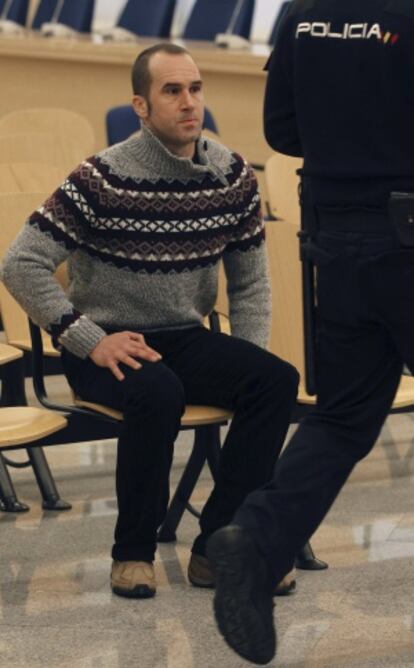Spain’s High Court to investigate ETA for crimes against humanity
Central criminal tribunal partly admits cases filed by terror victims’ associations But it has struck down arguments that the Basque group’s killings constituted genocide


Spain’s High Court is to investigate ETA leaders for crimes against humanity.
In a decision issued Friday, Judge Juan Pablo González wrote that the Basque terrorist group’s crimes were part of “a systematic attack against a segment of the civilian population.”
There were groups of people in the Basque Country who were “persecuted for political and ideological reasons,” and ETA’s goal was “to eliminate or expel from the territory” anyone whom it considered its political enemy, “using coercion or terror.”
In March of this year, a team of historians hired by the Basque government to analyze the years of terrorism in the region concluded that there was never a two-sided conflict, as ETA always alleged, but rather an attempt by the Basque armed group to impose its totalitarian project on a society that was fast embracing democracy.
Although ETA began killing in the 1960s, before the advent of democracy, the investigation will only focus on ongoing legal proceedings over crimes committed since October 2004, when the Spanish Penal Code introduced legislation covering crimes against humanity.
The maximum conviction for this offense is a 30-year prison term.
The maximum conviction for crimes against humanity is a 30-year prison term
The decision partially admits the cases brought by several victims’ associations and individuals. Although the victim support groups – Dignidad y Justicia and the Luis Portero Foundation – wanted ETA leaders to be tried for genocide as well, the judge considered that this only applies to persecutions of specific nationalities, ethnic groups, races or religious groups.
Although González agrees that ETA’s terrorism had a political aim, and that individuals who disagreed with its views were considered “an obstacle in the way of their political goals,” the victims included politicians, law enforcement officers, and also people with ties to Basque nationalism, “which highlights that the persecution was fundamentally political and ideological.”
The years covered by this investigation include 12 ETA murders, beginning with the bomb attack against Barajas airport in Madrid, an event that effectively ended an attempt at peace talks by the Socialist administration of José Luis Rodríguez Zapatero. The last attack took place on March 16, 2010, and took the life of a French gendarme.
In January 2011, ETA announced a “permanent, general and verifiable” ceasefire with the express aim of ending its more than 50-year campaign of violence. The group has yet to decommission its arsenal.
Since 2004, ETA has been successively led by Mikel Albizu, aka Mikel Antza, who was arrested together with his girlfriend Soledad Iparagirre in October of that year; by José Antonio Urritikoetxea, aka Josu Ternera, then by Francisco Javier López Peña, aka Thierry, who was arrested in France in May 2008. He was followed by Garikoitz Azpiazu, aka Txeroki, who was arrested in November of that same year.
Joint police work by Spain and France made it possible to arrest the new bosses, Aitzol Iriondo and Jurdan Martitegi, in December 2008 and April 2009.
Tu suscripción se está usando en otro dispositivo
¿Quieres añadir otro usuario a tu suscripción?
Si continúas leyendo en este dispositivo, no se podrá leer en el otro.
FlechaTu suscripción se está usando en otro dispositivo y solo puedes acceder a EL PAÍS desde un dispositivo a la vez.
Si quieres compartir tu cuenta, cambia tu suscripción a la modalidad Premium, así podrás añadir otro usuario. Cada uno accederá con su propia cuenta de email, lo que os permitirá personalizar vuestra experiencia en EL PAÍS.
¿Tienes una suscripción de empresa? Accede aquí para contratar más cuentas.
En el caso de no saber quién está usando tu cuenta, te recomendamos cambiar tu contraseña aquí.
Si decides continuar compartiendo tu cuenta, este mensaje se mostrará en tu dispositivo y en el de la otra persona que está usando tu cuenta de forma indefinida, afectando a tu experiencia de lectura. Puedes consultar aquí los términos y condiciones de la suscripción digital.








































